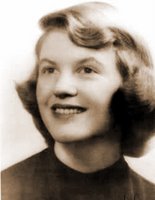Wednesday, November 01, 2006





The reaction against established intellectual academic poetry in the fifties took another form in the US and from there travelled to England with Sylvia Plath.
Robert Lowell and Theodore Roethke headed a group of poets called the Confessional poets. They were reacting against the poetry of T. S Eliot, Ezra Pound and Dylan Thomas.
Lowell and Roethke, together with younger poets like Anne Sexton and Sylvia Plath initiated a form of poetry which glorified the personal and the private and expressed their innermost secrets aloud for all to hear.
When Plath married Ted Hughes, an English poet and chose to make her home in the United Kingdom, the confessional movement no longer remained confine to the US.
Lowell first saw the horror, the boredom and the glory of Eliot's The Wasteland paralleled withing the mind. His Life Studies connects the meaningless and the hollowness of the outer world to the existing despair within
The Confessional poets had the desire to shock. They used unconventional themes, outspoken language and expressions of uncontained fury. The poet is forever seeking answers to questions that plague him on matters pertaining to his identity and situation in a larger scheme of things.
All this requires courage and it is courage that the confessional poets lay claim to the courage to come face to face with reality, no matter what the consequences, no matter how painful the experience.
Anne Sexton wrote an epigraph to To Bedlam and Part Way Back which is a quotation from a letter to Goethe from Schopenhauer.
"It is the courage to make a clean breast of it in the face of every question that makes a philosopher. He must be like Sophocles' Oedipus who, seeking enlightenment concerning his terrible fate, pursues his indefatigable inquiry, even when he divined that appalling horror awaits him in the answer. But most of us carry in our hearts the Jocasta who begs Oedipus for God's sake not to inquire further.
Sylvia Plath (10/27/1932-2/11/1963). Her father died when she was barely eight. She separated from her husband Ted Hughes. She first unsuccessfully attempted suicide at 21, the one of many and she finally succeeded at the age of 30, when she died on this day by if i am not wrong driving her volvo into the ocean.
The major part of poetry of Plath cries of helpless rage alternating with gloomy despair, its narcissistic concern with the individual self colouring all themes and subjects she chooses to write of.
Gregory Donovan, a VCU English professor, according to The Guardian says, "Poets don’t just come out of an overwhelming emotional experience.
"They come out of study and hard work. That's what made it possible to write such amazing poems later in life." :)
Meanwhile, this is an unpublished sonnet that Plath wrote in college while pondering themes in F Sott Fitzerland's novel The Great Gatsby
She wrote the phrase L'Ennuni (boredom) on her personal copy of the book alongside a passage in which Jay Gatsby's love interest Daisy Buchanan, complains that "I've been everywhere and seen everything and done everything."
You can find it here
http://www.blackbird.vcu.edu/v5n2/poetry/plath_s/ennui.htm
Labels: Poetry